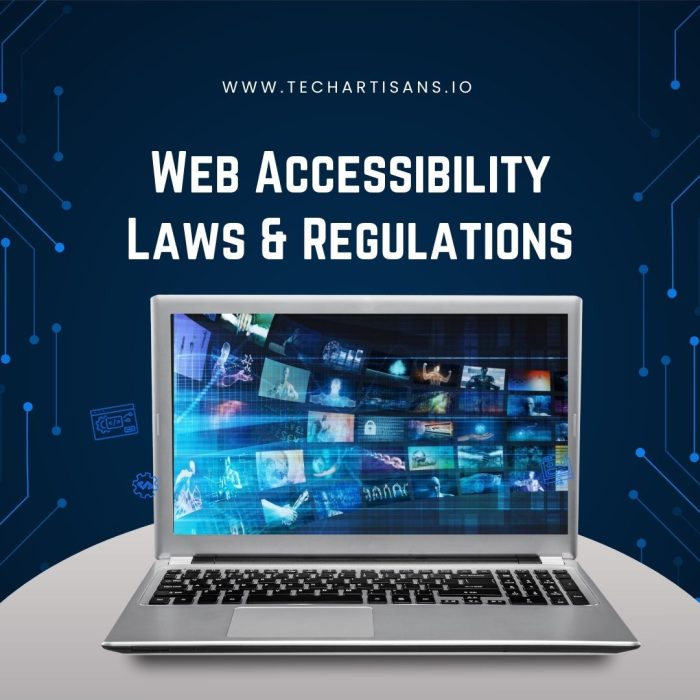In the rapidly evolving, digital-first post-lockdown world, web accessibility has steadily increased as an imperative for all businesses. Ensuring your website is accessible is no longer a mere courtesy – it’s a necessity. It broadens your audience and enhances your brand’s reputation. Complying with relevant laws and regulations, such as WCAG, is crucial to avoid legal problems. This guide simplifies these regulations, making it easier for small to medium businesses.
Importance of Web Accessibility
Web Accessibility is pivotal in creating an inclusive digital environment, leveling the field for all users, including those with disabilities. It not only ensures compliance with global standards like the WCAG but also paves the way for wider audience reach and improved brand perception.
Digital Age and Equal Internet Access
The advent of the digital age has propelled the internet into becoming a universal tool for communication, commerce, and information. Equal internet access is a prerequisite for ensuring fair opportunities for everyone, regardless of their physical abilities or limitations.
Web Accessibility: Morals and Regulations
Website accessibility isn’t just about fairness; it’s a legal requirement that reflects inclusivity. Following Website Accessibility Laws are crucial to avoid legal trouble and protect your company’s reputation. So, it’s important both ethically and legally.
Understanding Web Accessibility
Understanding web accessibility means ensuring that all users, regardless of their physical abilities or limitations, can access, understand, navigate, and interact with your website. It involves adhering to the WCAG guidelines to create an inclusive digital environment that is user-friendly and legally compliant. Explore our detailed guide on Web Accessibility Standards.
Four Principles of Web Accessibility
The four principles of web accessibility are essential to ensuring a site is accessible to all. Perceivable means the information must be presentable to users in ways they can perceive, for example, by providing text alternatives for non-text content.
Operable means users can interact with all controls and interactive elements using either the mouse, keyboard, or an assistive device.
Understandable information and user interface operate in predictable ways, and users are given assistance in avoiding and correcting mistakes.
by Robust website ensures content can be reliably interpreted by a wide variety of user agents, including assistive technologies.
Role Of the World Wide Web Consortium (WCAG)
The World Wide Web Consortium (W3C) plays an instrumental role in establishing universal standards for web content accessibility. The Web Content Accessibility Guidelines (WCAG), formulated by W3C, serve as the go-to resource for businesses aiming to make their digital platforms accessible to all. These guidelines provide a clear, comprehensive framework for enhancing web accessibility, thereby fostering inclusivity on the internet.
Stay informed about Web Accessibility Laws and Regulations.
Key Web Accessibility Laws and Regulations
Website Accessibility Laws and Regulations ensure an inclusive digital environment for all users. Let’s look at these pivotal Website Accessibility Laws and Regulations.
Overview of (ADA) and its Titles
Enacted in 1990, the Americans with Disabilities Act (ADA) is a comprehensive civil rights law prohibiting discrimination against individuals with disabilities in all areas of public life. The Act is divided into five sections, known as titles, each addressing different aspects of public life.
Title I: Employment
Prohibits employers from discriminating against qualified individuals with disabilities, promoting equal employment opportunities.
Title II: Public Services
Requires public entities to provide accessible services and facilities for individuals with disabilities.
Title III: Public Accommodations
Mandates businesses to make accommodations accessible to individuals with disabilities, which extends to their websites in the digital age.
By understanding ADA, businesses can better align their web accessibility practices with regulatory expectations, ensuring they operate inclusively and lawfully.
Section 508 Amendment to the Rehabilitation Act of 1973
Section 508, part of the Rehabilitation Act, requires federal agencies to make their electronic and information technology accessible to disabled individuals. It covers federal websites, intranets, extranets, software, and hardware. Understanding it helps businesses ensure their websites are accessible and compliant with Website Accessibility Laws, creating an inclusive online environment.
International Web Accessibility Laws and the EU Directive
Around the world, website accessibility is a priority, with varying laws and regulations in different countries. In Europe, the EU Website Accessibility Directive mandates accessibility for public sector websites and mobile apps across member states to foster inclusivity. Understanding these international laws, like the EU Directive, helps businesses serve a global audience, making their digital content accessible and compliant with global Website Accessibility Laws.
Risks of Non-Compliance
Non-compliance with website accessibility laws and regulations can lead to many business risks, which extend beyond legal implications. Let’s delve into understanding the potential perils of failing to comply. Find out how to avoid risks with our guide on How to Check if a Website Is Accessible.
Legal Implications
Non-compliance with website accessibility laws can result in legal consequences, most notably lawsuits. In recent years, there’s been a significant rise in litigation related to website accessibility, with businesses facing legal action for not making their websites accessible to all, particularly individuals with disabilities.
Revenue Implications
Failing to adhere to web accessibility standards can result in losing a significant market share. Businesses that neglect this aspect risk alienating a substantial section of potential customers—those with disabilities. By not making their websites accessible, they’re essentially turning away this pool of potential customers, resulting in missed sales opportunities and decreased revenue.
Damage to Brand Reputation
Non-compliance with web accessibility laws can inflict significant damage to a brand’s reputation. Customers view businesses that ignore accessibility as less considerate and inclusive, which can lead to a loss of customer trust and loyalty. This can be detrimental to a brand’s long-term success.
Steps to Ensure Compliance
The following steps provide a roadmap for businesses to ensure their websites are fully compliant, promoting an inclusive digital presence and mitigating legal and reputational risks. ake the necessary steps with our guide on Web Accessibility Testing.
Understanding and Implementing WCAG Guidelines
WCAG are global standards for web accessibility, organized into POUR principles, ensuring disabled individuals can use the web. To comply, design your site with alt text for images, audio transcripts, keyboard navigation, and regular compliance testing. This shows your commitment to inclusivity and legal adherence as a business owner.
Role of Automated Solutions
Automated website accessibility solutions, like plugins and AI-powered tools, simplify compliance with WCAG and other accessibility laws. They scan for issues, offer real-time fixes, and help businesses ensure their website is accessible to all users. This makes them practical for small to medium businesses aiming for inclusivity and compliance. Optimize your website with our insights on How to Measure Web Performance.
Educating the Team on Web Accessibility Best Practices
Education is a cornerstone of website accessibility implementation. Regular training sessions on best practices can empower your team to create and maintain an accessible website. This includes understanding WCAG guidelines, learning how to utilize accessibility tools, and cultivating a mindset of inclusivity. By embedding website accessibility knowledge within your team, you ensure ongoing compliance with Website Accessibility Laws and Regulations.
Benefits of Web Accessibility
Let’s explore the significant advantages that come with prioritizing website accessibility. Discover the advantages of having an accessible website: The Benefits of Having an Accessible Website.
Enhancing User experience
Website accessibility enhances the user experience for everyone, not just those with disabilities. It involves creating an inclusive digital environment where all users can interact smoothly. By adhering to WCAG guidelines, businesses can ensure their websites are easy to navigate, understand, and use, improving overall customer satisfaction and fostering positive brand experiences.
Boosting Brand Reputation
Adhering to website accessibility standards helps to boost brand reputation and trust. When businesses show commitment to inclusivity and accessibility, it sends a positive message to all users, demonstrating a sense of corporate responsibility. This can significantly enhance the public’s perception of the brand and foster a deeper level of trust among existing customers and potential prospects.
Increased Revenue and Market Share Potential
Prioritizing web accessibility can lead to increased revenue and market share. By making websites accessible, businesses open doors to a larger audience, including those with disabilities. This can result in a notable increase in website traffic, customer conversions, and, ultimately, sales.
Conclusion
Web accessibility is a crucial aspect in today’s digital age, serving both a moral and legal obligation. It paves the way for inclusivity and equal opportunities, reinforcing the values that underpin our society. Businesses must make proactive efforts to assess and enhance their web accessibility, bringing positive change to everyone’s digital experience. Learn about the Most Common Web Accessibility Issues and how to address them.







